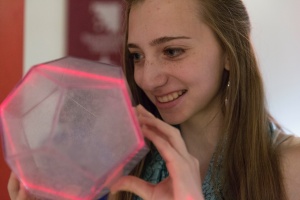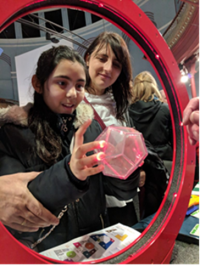Difference between revisions of "Wall of Fire"
| Line 10: | Line 10: | ||
==Description== | ==Description== | ||
| + | [[File:Ring_of_Fire_MathsWorldUK.png|200px|thumb|The Ring of Fire.]] | ||
| + | |||
The exhibit consists of a laser device that projects a plane (a wall) of light. The visitor has some translucent objects (cube, cone, cylinder, tetrahedron, and dodecahedron) that he or she can insert into the plane of light to reveal a cross-section of the body. | The exhibit consists of a laser device that projects a plane (a wall) of light. The visitor has some translucent objects (cube, cone, cylinder, tetrahedron, and dodecahedron) that he or she can insert into the plane of light to reveal a cross-section of the body. | ||
| Line 20: | Line 22: | ||
==History and museology== | ==History and museology== | ||
This smaller version, Ring of Fire, was part of the Math Midway exhibition by MoMath. Several replicas sold by MoMath are on display in other museums (e.g., ix quadrat, MathsWorldUK, MMACA, the Science Centre of Singapore). Two copies are also traveling in Brazil. | This smaller version, Ring of Fire, was part of the Math Midway exhibition by MoMath. Several replicas sold by MoMath are on display in other museums (e.g., ix quadrat, MathsWorldUK, MMACA, the Science Centre of Singapore). Two copies are also traveling in Brazil. | ||
| + | |||
==Resources== | ==Resources== | ||
* [https://patents.google.com/patent/US8602790B1/ U.S. Patent 8,602,790] | * [https://patents.google.com/patent/US8602790B1/ U.S. Patent 8,602,790] | ||
* [https://patents.google.com/patent/US9165479B1/ U.S. Patent 9,165,479] | * [https://patents.google.com/patent/US9165479B1/ U.S. Patent 9,165,479] | ||
Latest revision as of 02:00, 8 September 2021
| Wall of Fire | |
|---|---|

| |
| On display at | National Museum of Mathematics |
| Type | Hands-on |
| Topics | Polyhedra, sections of solids |
The Wall of Fire is an exhibit at MoMath. A portable version of this exhibit is called Ring of Fire.
Contents
Description
The exhibit consists of a laser device that projects a plane (a wall) of light. The visitor has some translucent objects (cube, cone, cylinder, tetrahedron, and dodecahedron) that he or she can insert into the plane of light to reveal a cross-section of the body.
Activities and user interaction
Highlight the sometimes-surprising cross-sections of different objects by using a plane of laser light to cut through their surfaces.
Mathematical background
The exploration of cross sections of regular solids can reveal geometric properties such as symmetry, dihedral angles, and the relation of polygons to polyhedra. The cone is essential for exploring the conic sections.
History and museology
This smaller version, Ring of Fire, was part of the Math Midway exhibition by MoMath. Several replicas sold by MoMath are on display in other museums (e.g., ix quadrat, MathsWorldUK, MMACA, the Science Centre of Singapore). Two copies are also traveling in Brazil.
